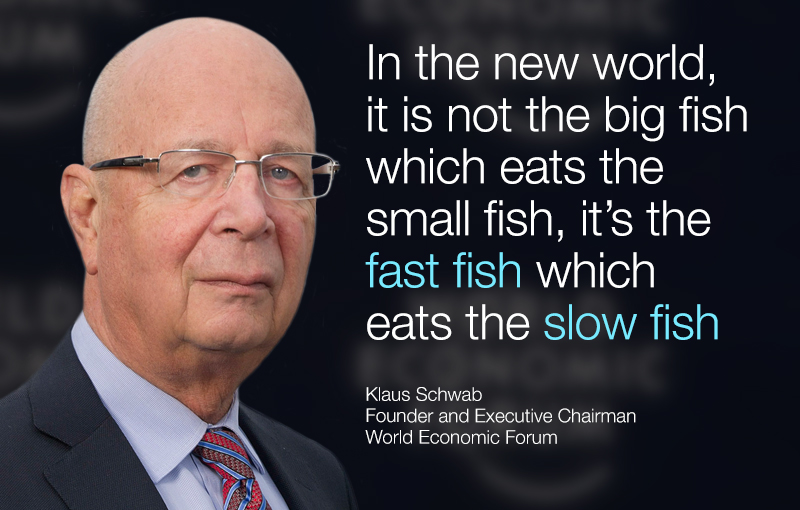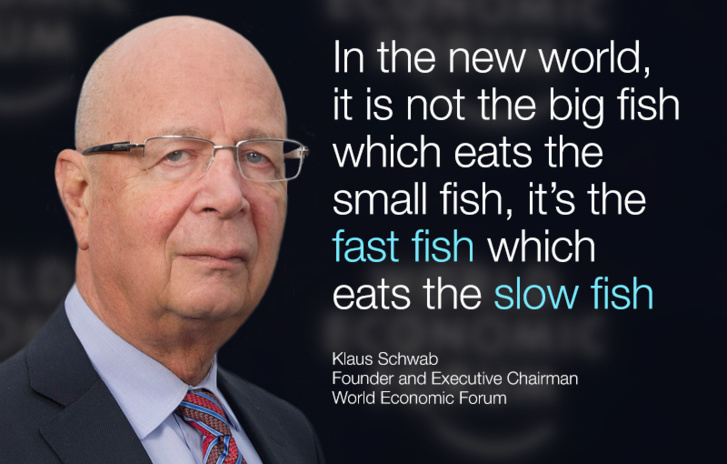But now it has become clear that we have entered a new era – we are living in the “post-post crisis” world. What does this mean?
It means that almost everything we once knew is changing. For the foreseeable future, we will have to get used to slower growth rates. In the new world, it is not the big fish which eats the small fish, it’s the fast fish which eats the slow fish.
One of the defining features of this new era is the rapid pace of technological change. It is so fast that people are even referring to it as a technological revolution. This revolution is unlike any previous one in history, and it will affect us all in ways we cannot even begin to imagine.
A different kind of revolution
The first thing that sets this revolution apart from others is how disruptive it is. In the past we had revolutions – perhaps they would be better described as evolutions – that came at a relatively slow pace, like long waves in the ocean. The impact of the first Industrial Revolution, which began in Britain in the 1780s did not fully begin to be felt until the 1830s and 1840s. Today technological change happens like a tsunami. You see small signs at the shore, and suddenly the wave sweeps in.
The second thing that explains the different nature of this revolution is just how interconnected everything is. Technology, security, economic growth, sustainability. Technological change is never an isolated phenomenon. This revolution takes place inside a complex eco-system which comprises business, governmental and societal dimensions. To make a country fit for the new type of innovation driven competition the whole ecosystem has to be considered.
So if one thing changes – or is changing constantly, as in the case of technology – the whole system needs to change to keep up.
The third big difference is the fact that the technological revolution is not just changing what we do and how we do it – it is changing us, it is changing our lives, and it is changing the way we see the world. Just look at how the internet has altered the notion of privacy. Young people have a completely different understanding of the idea of privacy compared to older generations.
Everyone will feel the effects
We often hear people talk about the concept of ‘uberization’, where a new technology completely turns an industry on its head and forces us to rethink the way things have always been done. No industry will remain untouched by these forces.
Speaking recently to a CEO from one of the world’s largest aluminium manufacturers, I commented on how lucky his company was not to be affected by this revolution. As he was quick to point out, technologies such as 3D printing will completely transform his industry’s supply chain, with knock-on effects we probably have not even considered.
And the revolution will not just affect industries – it will also affect people. Many of the consequences will be positive. For example, medical research and technological innovations mean that in places like Switzerland, one in two babies born today will live beyond 100.
But whatever the changes, almost all of them will present a challenge. As new technologies make old jobs obsolete, for example, every person will have to make sure they are equipped with the skills needed for this new era of ‘talentism’ – where human imagination and innovation are the driving forces behind economies, as opposed to capital or natural resources.
Governments will also feel the impact of these changes. In the future, people will not be satisfied with ordering only their taxis through an easy-to-use application. They will also want to access public services in a similar way. More than any other sector, governments can also shape the consequences of the technological revolution, ensuring that the challenges are managed and the opportunities seized.
For example, although innovation and creativity tend to be driven by the private sector, governments create the environment that allows these things to flourish. They also have a large role to play in ensuring citizens are equipped to make the most of these tranformations.
Change can be frightening and the temptation is often to resist it. But change almost always provides opportunities – to learn new things, to rethink tired processes and to improve the way we work. The technological revolution has only just begun, and the transformations it will bring are a cause not just for excitement, but for hope.
Author: Professor Klaus Schwab is the Founder and Executive Chairman of the World Economic Forum.
www.weforum.org
It means that almost everything we once knew is changing. For the foreseeable future, we will have to get used to slower growth rates. In the new world, it is not the big fish which eats the small fish, it’s the fast fish which eats the slow fish.
One of the defining features of this new era is the rapid pace of technological change. It is so fast that people are even referring to it as a technological revolution. This revolution is unlike any previous one in history, and it will affect us all in ways we cannot even begin to imagine.
A different kind of revolution
The first thing that sets this revolution apart from others is how disruptive it is. In the past we had revolutions – perhaps they would be better described as evolutions – that came at a relatively slow pace, like long waves in the ocean. The impact of the first Industrial Revolution, which began in Britain in the 1780s did not fully begin to be felt until the 1830s and 1840s. Today technological change happens like a tsunami. You see small signs at the shore, and suddenly the wave sweeps in.
The second thing that explains the different nature of this revolution is just how interconnected everything is. Technology, security, economic growth, sustainability. Technological change is never an isolated phenomenon. This revolution takes place inside a complex eco-system which comprises business, governmental and societal dimensions. To make a country fit for the new type of innovation driven competition the whole ecosystem has to be considered.
So if one thing changes – or is changing constantly, as in the case of technology – the whole system needs to change to keep up.
The third big difference is the fact that the technological revolution is not just changing what we do and how we do it – it is changing us, it is changing our lives, and it is changing the way we see the world. Just look at how the internet has altered the notion of privacy. Young people have a completely different understanding of the idea of privacy compared to older generations.
Everyone will feel the effects
We often hear people talk about the concept of ‘uberization’, where a new technology completely turns an industry on its head and forces us to rethink the way things have always been done. No industry will remain untouched by these forces.
Speaking recently to a CEO from one of the world’s largest aluminium manufacturers, I commented on how lucky his company was not to be affected by this revolution. As he was quick to point out, technologies such as 3D printing will completely transform his industry’s supply chain, with knock-on effects we probably have not even considered.
And the revolution will not just affect industries – it will also affect people. Many of the consequences will be positive. For example, medical research and technological innovations mean that in places like Switzerland, one in two babies born today will live beyond 100.
But whatever the changes, almost all of them will present a challenge. As new technologies make old jobs obsolete, for example, every person will have to make sure they are equipped with the skills needed for this new era of ‘talentism’ – where human imagination and innovation are the driving forces behind economies, as opposed to capital or natural resources.
Governments will also feel the impact of these changes. In the future, people will not be satisfied with ordering only their taxis through an easy-to-use application. They will also want to access public services in a similar way. More than any other sector, governments can also shape the consequences of the technological revolution, ensuring that the challenges are managed and the opportunities seized.
For example, although innovation and creativity tend to be driven by the private sector, governments create the environment that allows these things to flourish. They also have a large role to play in ensuring citizens are equipped to make the most of these tranformations.
Change can be frightening and the temptation is often to resist it. But change almost always provides opportunities – to learn new things, to rethink tired processes and to improve the way we work. The technological revolution has only just begun, and the transformations it will bring are a cause not just for excitement, but for hope.
Author: Professor Klaus Schwab is the Founder and Executive Chairman of the World Economic Forum.
www.weforum.org
Chaineum est partenaire des rubriques blockchain de votre quotidien Finyear.
Pour lire tous les articles Finyear dédiés Blockchain rendez-vous sur www.finyear.com/search/Blockchain/
Chaineum est partenaire de la conférence Blockchain Business du 10 décembre prochain éditée par Finyear.
Pour participer à la conférence inscrivez-vous sur www.bl0ckcha1n.com
Chaineum est bâtisseur de compagnies autonomes et décentralisées (incubateur new generation de projets blockchain).
Vous êtes investisseur, porteur de projet, développeur ? Rejoignez Chaineum
Vous êtes CEO, commercial, etc... et vous cherchez à rejoindre une équipe pour développer un projet ? Rejoignez Chaineum : nous avons des startups qui recherchent leur(s) futur(s) associé(s).
Pour lire tous les articles Finyear dédiés Blockchain rendez-vous sur www.finyear.com/search/Blockchain/
Chaineum est partenaire de la conférence Blockchain Business du 10 décembre prochain éditée par Finyear.
Pour participer à la conférence inscrivez-vous sur www.bl0ckcha1n.com
Chaineum est bâtisseur de compagnies autonomes et décentralisées (incubateur new generation de projets blockchain).
Vous êtes investisseur, porteur de projet, développeur ? Rejoignez Chaineum
Vous êtes CEO, commercial, etc... et vous cherchez à rejoindre une équipe pour développer un projet ? Rejoignez Chaineum : nous avons des startups qui recherchent leur(s) futur(s) associé(s).
Les médias du groupe Finyear
Lisez gratuitement :
Le quotidien Finyear :
- Finyear Quotidien
La newsletter quotidienne :
- Finyear Newsletter
Recevez chaque matin par mail la newsletter Finyear, une sélection quotidienne des meilleures infos et expertises de la finance d’entreprise et de la finance d'affaires.
Les 4 lettres mensuelles digitales :
- Le Directeur Financier
- Le Trésorier
- Le Credit Manager
- Le Capital Investisseur
Le magazine bimestriel digital :
- Finyear Magazine
Un seul formulaire d'abonnement pour recevoir un avis de publication pour une ou plusieurs lettres
Le quotidien Finyear :
- Finyear Quotidien
La newsletter quotidienne :
- Finyear Newsletter
Recevez chaque matin par mail la newsletter Finyear, une sélection quotidienne des meilleures infos et expertises de la finance d’entreprise et de la finance d'affaires.
Les 4 lettres mensuelles digitales :
- Le Directeur Financier
- Le Trésorier
- Le Credit Manager
- Le Capital Investisseur
Le magazine bimestriel digital :
- Finyear Magazine
Un seul formulaire d'abonnement pour recevoir un avis de publication pour une ou plusieurs lettres
Autres articles
-
Coinbase et Visa, un partenariat pour des transferts en temps réel
-
Brilliantcrypto, la nouvelle aventure play-to-earn basée sur la blockchain Polygon, arrive sur Epic Game Store
-
Nomination | Truffle Capital promeut Alexis Le Portz en qualité de Partner
-
IPEM Paris 2024 : 5500 participants au Palais des congrès
-
Pomelo annonce une Série A à 35 millions de dollars menée par Vy Capital






